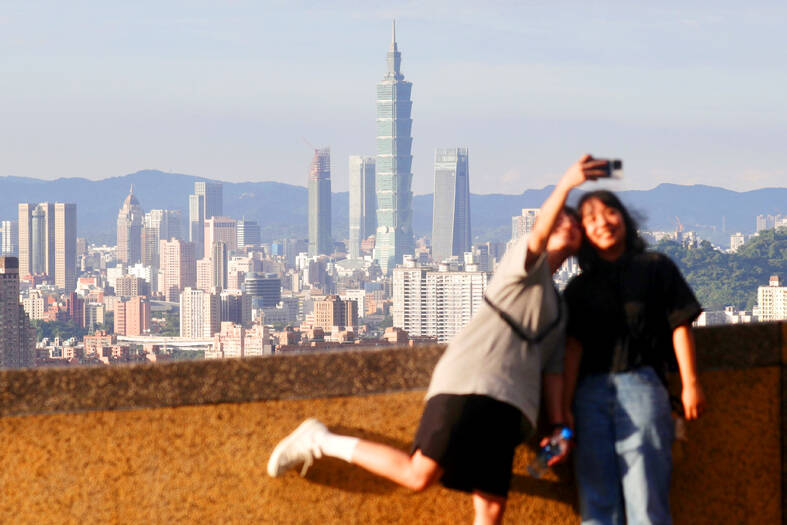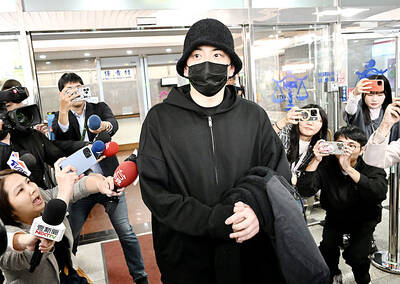InterNations has ranked Taiwan fifth among nations most favored by expatriates, trailing Mexico, Spain, Panama and Malaysia, the social media platform said in its Expat Insider report.
This year’s report was the 10th published by InterNations, which seeks to “make expat life a great experience.”
The ranking of 53 destinations was based on a survey conducted from Feb. 2 to 28 among 12,065 expats of 171 nationalities living in 178 countries. A country needed at least 50 respondents to be included in the analysis.

Photo: RITCHIE B. TONGO, EPA-EFE
The analysis ranked countries in 56 categories affecting quality of life for expats as reported by respondents, including cost of living, availability of housing, career opportunities, access to high-speed Internet, personal safety and healthcare.
Ninety-one percent of expat resident of Mexico, which was the highest-ranked country in the survey for the second consecutive year, said that they were happy in the country, beating the global average of 72 percent, the report said.
Taiwan, which was second for quality of life, was buoyed on the overall ranking by the nation’s healthcare services, which have consistently topped that category, it said.
About 91 percent in Taiwan reported being satisfied with the affordability of medical care, higher than the 62 percent global average, while 93 percent reported satisfaction with the availability of care, beating the 71 percent global average, it said.
Sixty percent of respondents in Taiwan gave the nation top marks for quality of healthcare, compared with the 35 percent global average, the survey said, adding that South Korea was the only country to receive a higher rating for medical care quality.
Taiwan had a 95 percent approval rating for the affordability of public transportation and 88 percent for its availability, higher than the global averages of 71 and 73 respectively, it said.
No respondents reported feeling unsafe in Taiwan, outperforming the 8 percent global average, while 73 percent in the nation gave personal safety the highest possible rating, it said.
“Taiwan is safe and has low crime. The trains make it easy to travel the island,” a US expat was quoted as saying.
China was 26th on the overall list, the US 30th and Japan 44th, the survey said.

The National Immigration Agency (NIA) said yesterday that it will revoke the dependent-based residence permit of a Chinese social media influencer who reportedly “openly advocated for [China’s] unification through military force” with Taiwan. The Chinese national, identified by her surname Liu (劉), will have her residence permit revoked in accordance with Article 14 of the “Measures for the permission of family- based residence, long-term residence and settlement of people from the Mainland Area in the Taiwan Area,” the NIA said in a news release. The agency explained it received reports that Liu made “unifying Taiwan through military force” statements on her online

A magnitude 5.7 earthquake struck off Taitung County at 1:09pm today, the Central Weather Administration (CWA) said. The hypocenter was 53km northeast of Taitung County Hall at a depth of 12.5km, CWA data showed. The intensity of the quake, which gauges the actual effect of a seismic event, measured 4 in Taitung County and Hualien County on Taiwan's seven-tier intensity scale, the data showed. The quake had an intensity of 3 in Nantou County, Chiayi County, Yunlin County, Kaohsiung and Tainan, the data showed. There were no immediate reports of damage following the quake.

Actor Darren Wang (王大陸) is to begin his one-year alternative military service tomorrow amid ongoing legal issues, the Ministry of the Interior said yesterday. Wang, who last month was released on bail of NT$150,000 (US$4,561) as he faces charges of allegedly attempting to evade military service and forging documents, has been ordered to report to Taipei Railway Station at 9am tomorrow, the Alternative Military Service Training and Management Center said. The 33-year-old would join about 1,300 other conscripts in the 263rd cohort of general alternative service for training at the Chenggong Ling camp in Taichung, a center official told reporters. Wang would first

A BETRAYAL? It is none of the ministry’s business if those entertainers love China, but ‘you cannot agree to wipe out your own country,’ the MAC minister said Taiwanese entertainers in China would have their Taiwanese citizenship revoked if they are holding Chinese citizenship, Mainland Affairs Council (MAC) Minister Chiu Chui-cheng (邱垂正) said. Several Taiwanese entertainers, including Patty Hou (侯佩岑) and Ouyang Nana (歐陽娜娜), earlier this month on their Weibo (微博) accounts shared a picture saying that Taiwan would be “returned” to China, with tags such as “Taiwan, Province of China” or “Adhere to the ‘one China’ principle.” The MAC would investigate whether those Taiwanese entertainers have Chinese IDs and added that it would revoke their Taiwanese citizenship if they did, Chiu told the Chinese-language Liberty Times (sister paper